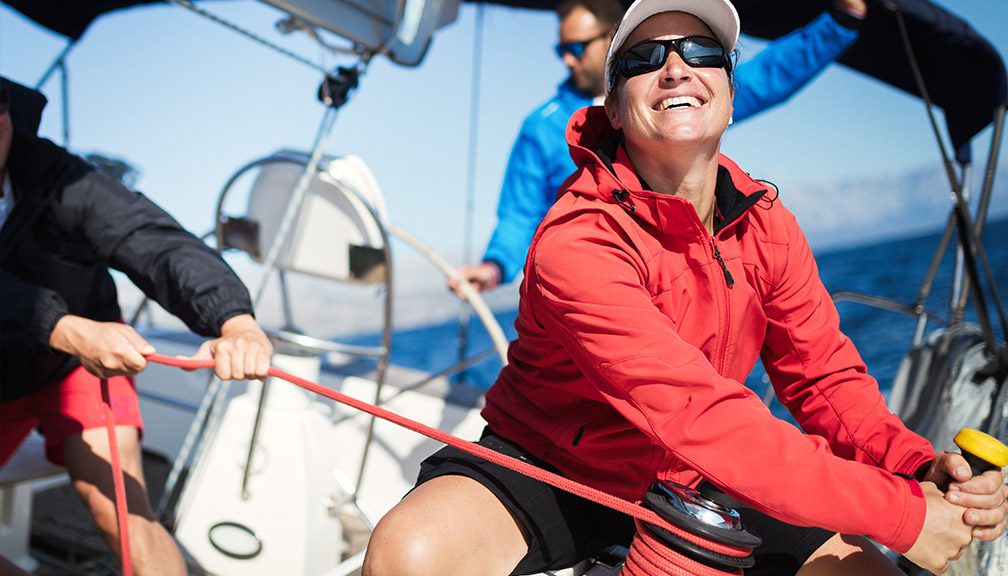Common boat insurance claims and how to avoid them.

Boating is all about a fun day on the water, but it isn’t always smooth sailing. In 2020, the United States Coast Guard reported 5,265 boating accidents, which was substantially higher than the year before. Fortunately, there are simple measures you can take to prevent risk, accidents, and claims.
Before you cruise, peruse the seven most common boat insurance claims and ways to avoid them:
Claim #1: Hitting underwater objects
Debris and rocks can be hidden below the water’s surface, so one of the best ways to avoid them is by staying in the marked channels while boating. Watch water depth closely as grounding in shallow water can cause significant damage to your boat. Depth sounders can also reduce the risk of striking a submerged object. If you own one, pay close attention to the device, especially when in unfamiliar waters. Look out for any buoys or markers that could indicate potential risks to your boat. And as always, drive slowly, responsibly, and cautiously.
Claim #2: Weather damage
Severe weather can cause destruction to your boat at the dock or on the water. Check weather reports before you go out to ensure you’ll have a safe time. If weather does turn for the worse when you’re out, put on lifejackets, return to shore immediately, and secure your boat. Take extra precautions at the dock during severe weather to avoid damage, like putting fenders on the boat, removing items that could become debris, and verifying that your boat is watertight. When you winterize your boat for the season, have the marina double-check your vessel and inspect it for any bellow issues.
Claim #3: Injury
Put safety first to avoid injuries for passengers, drivers, and other vessels. As a boater, it’s your responsibility to complete necessary training for your state and learn the ropes of navigation, communication, and life-saving measures before hitting the water. Another way to stay safe? Avoid drinking alcohol, especially if you’re the operator. The combination of alcohol and boating is one of the leading causes of accidents on the water. Lastly, make sure there are always enough life jackets available for all the people on your boat. Have fun and maintain a safe atmosphere to reduce the potential risk for injury.
Claim #4: Collisions
Know and enforce rules from your boating safety course every time you’re on the water. Monitor your speed to avoid creating wakes, and pay special attention to neighboring boats while docking or leaving the docking area. Have passengers act as extra sets of eyes and stay attentive to what is happening around you. Designate one individual who is your second-in-command to look out for boats or objects to prevent collisions.
Claim #5: Theft
Theft from small belongings to the boat itself is a top marine insurance claim. If your boat is being moved or stored out of water, take the extra precaution of removing the motor, placing a lock on the trailer, and removing any personal belongings that could easily be taken. When it’s docked, remove navigation gear from obvious sight and secure any valuables that remain on board. The main goal is to make it harder for thieves to succeed and deter the behavior.
Claim #6: Sinking
Sinking puts boats permanently out of commission. That means one of the most important upkeeps on a boat is verifying that it’s watertight. Check that the fittings, such as hoses and clamps, are doing their job and are keeping the water out.
Claim #7: Fire
It’s not always the biggest fear on the water, but fire can cause serious, irreversible damage to a boat. Many boat fires start with faulty wiring or fueling issues that can spark an explosion. Look for any rusting on outlets or chafing of wires to guarantee you’re not at risk. It is especially important to pay attention if you ever smell gas. If you do, immediately get off the boat and have it checked. As a final precaution against fire, keep a fire extinguisher with you on board.
Knowing the common boat insurance claims and following the tips to avoid them is the best way to protect your investment and your passengers. The other critical step? Getting the right watercraft coverage. Talk to a local, independent agent today.







